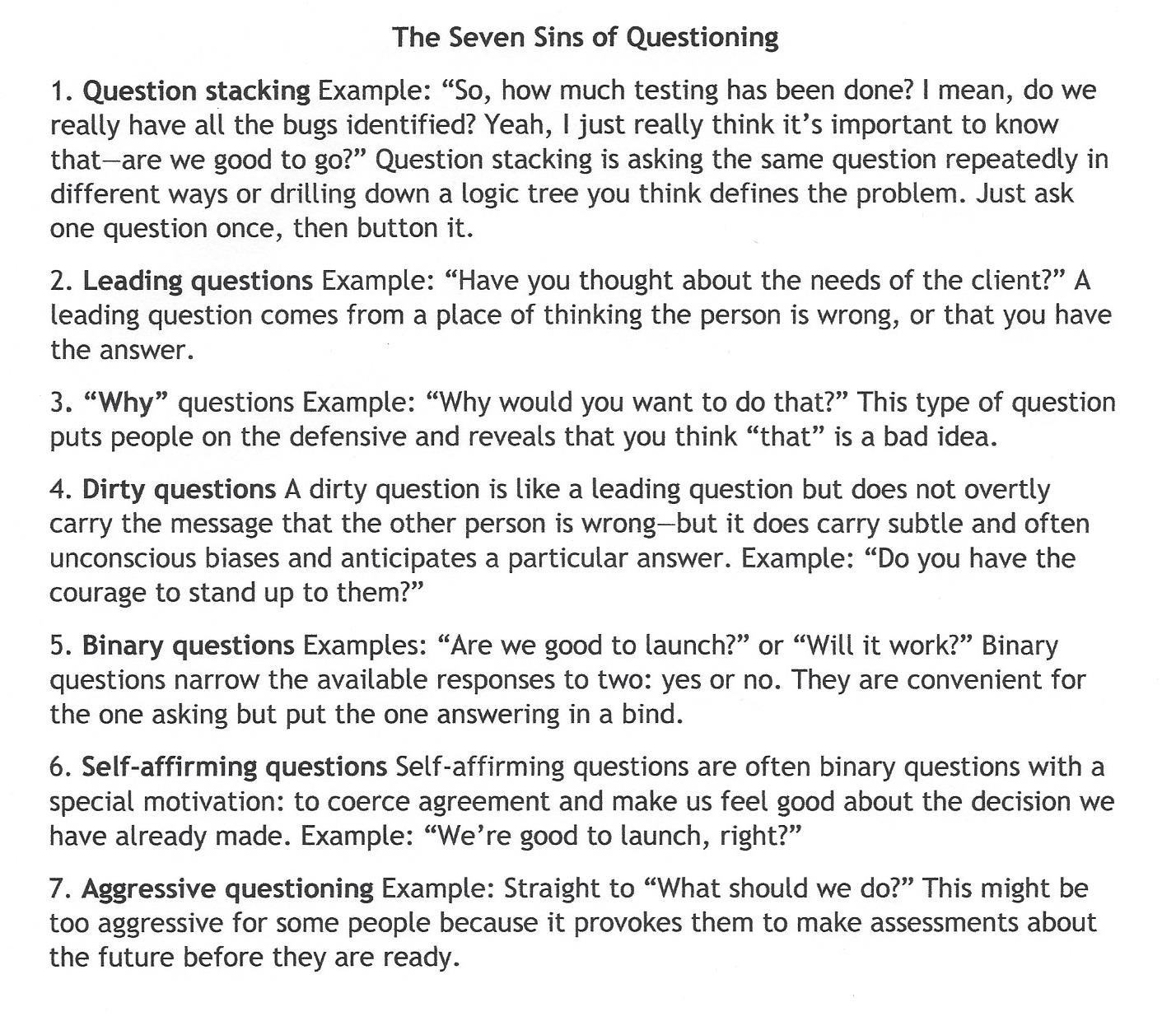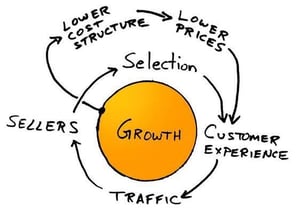 Being curious about what someone else thinks is the foundation of asking good questions.
Being curious about what someone else thinks is the foundation of asking good questions.
There is such a thing as a bad question: one that is less curiosity driven than others.
The right question asked the right way will get you the right outcome. Asked a slightly different way, you’ll wind up with a different response and a different outcome.
The captain on the El Faro (see How Language Sunk the El Faro – Leadership is Language) asked a lot of questions as his ship plowed toward its doom.
The words were false comfort designed to keep people on task, conforming to their roles, and continuing course.
Asking the Right Question
In Leadership is Language, David Marquet, shares a story of having lunch with Shane Mac, the CEO of Assist when Mac received a text from their project lead.
It was six hours to game time at Citizens Bank Park in Philadelphia.
Assist planned to field-test a new product that would enable people to scan a bar code on the back of their seats with their iPhones, select the beer or food they wanted, enter their seat number, and have an attendant show up with their order moments later. The system required interfaces between several company software systems, the service organization at the stadium that would handle physical delivery of the orders, the stadium, and an intermediary.
A successful demonstration would raise its value and prove not just that the technology was sound, but that it successfully met a real customer demand.
Shane immediately called his project lead at the stadium working through the issues.
At the end of their short conversation, Shane said, “Tell me if you need me to come over.” He said it rather emphatically. After a pause, he said, “OK,” and hung up.
While David had only heard Shane’s side of the conversation, he suggested Shane call back and rephrase the last thing he’d said to her, “How helpful would it be if I came over to the stadium, 0 to 5?”
He called..jpg?width=300&name=Seven%20Ways%20to%20Ask%20Better%20Questions%20(Language%20is%20Leadership).jpg)
Pause.
The answer was “5.”
Shane’s eyes got big. He hung up, stood up, threw a $5 bill on the table, and called an Uber to take us to the stadium.
This story ended happily. Shane’s teams solved the problem well before the Phillies took the field, and the demonstration worked.
When Shane said, “Tell me if you need me,” it required his project lead to admit she needed help and to give instructions to her CEO. These are hard to do, even for a kick-ass, take-names project owner like the woman leading Shane’s development team. If she had been a wilting lily, you could attribute her reluctance to ask Shane for help to that. But she wasn’t.
Once he asked, “How helpful would it be if I came over?” it became a request for information. Notice how he phrased the question. He didn’t ask, “Would it be helpful . . . ?”
That would have been a binary question. It would have made it harder for her to say “yes.”
It’s important to mention Marquet warns language changes don’t have the certainty of a light switch. Every step you take to make it just a bit easier for others to feel safe to speak up results in a higher likelihood they will.
These little probabilities, over time, over repeated meetings, and interactions, add up to a big change.
The Seven Sins of Questioning
 This gives some examples. Marquet calls these the seven sins of questioning.
This gives some examples. Marquet calls these the seven sins of questioning.
Would you like to ask better questions to help drive discretionary effort?
For more examples and help on asking better questions click here for The Seven Sins of Questioning & Seven Ways to Ask Better Questions.
Growth demands Strategic Discipline.
-2.jpg?width=300&name=3%20Disciplines%20of%20Execution%20(Strategic%20Discipline)-2.jpg) To build an enduring great organization, requires disciplined people, disciplined thought, disciplined action, to produce superior results, and make a distinctive impact in the world.
To build an enduring great organization, requires disciplined people, disciplined thought, disciplined action, to produce superior results, and make a distinctive impact in the world.
Discipline sustains momentum, over a long period of time, laying the foundations for lasting endurance.
A winning habit starts with 3 Strategic Disciplines: Priority, Metrics and Meeting Rhythms. Forecasting, accountability, individual, and team performance improve dramatically.
Meeting Rhythms achieve a disciplined focus on performance metrics to drive growth.
Let Positioning Systems help your business achieve these outcomes on the Four most Important Decisions your business faces:
|
DECISION |
RESULT/OUTCOME |
|
PEOPLE |
|
|
STRATEGY |
|
|
EXECUTION |
|
|
CASH |
|
Positioning Systems helps mid-sized ($5M - $250M) business Scale-UP. We align your business to focus on Your One Thing! Contact dwick@positioningsystems.com to Scale Up your business! Take our Four Decisions Needs Assessment to discover how your business measures against other Scaled Up companies. We’ll contact you.
NEXT BLOG – Bezonomics - How Amazon Flywheel transformed its business
In 2001, Amazon stock went from $107 a share down to $6 a share.  Barron’s ran a headline “Amazon.bomb.” Wall Street analysts said the company would run out of cash by end of year. Bezos was worried. Bezos invited Jim Collins to talk to him and the board about how to get out of a crisis. Jim Collins explained the flywheel concept. Bezos applied it to Amazon. It started with the customer (give them lower prices, better service, faster delivery) to attract more customers/3rd party sellers and get economies of scale. Bezos has been driving this for the last 20 years with remarkable success. That’s our next blog.
Barron’s ran a headline “Amazon.bomb.” Wall Street analysts said the company would run out of cash by end of year. Bezos was worried. Bezos invited Jim Collins to talk to him and the board about how to get out of a crisis. Jim Collins explained the flywheel concept. Bezos applied it to Amazon. It started with the customer (give them lower prices, better service, faster delivery) to attract more customers/3rd party sellers and get economies of scale. Bezos has been driving this for the last 20 years with remarkable success. That’s our next blog.






.jpeg?width=150&height=135&name=Hand%20with%20marker%20writing%20the%20question%20Whats%20Next_%20(1).jpeg)

